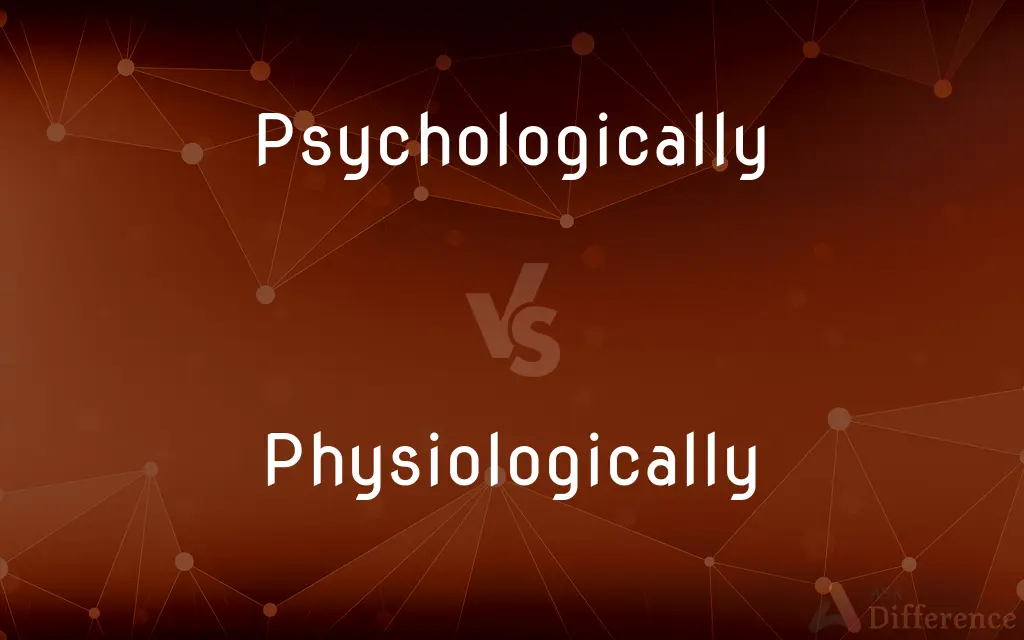Psychologically vs. Physiologically — What's the Difference?
By Tayyaba Rehman & Urooj Arif — Published on February 26, 2024
Psychologically pertains to the mind and mental processes, while physiologically relates to the body's physical and biological functions. Both terms explore human responses but from different aspects: mental vs. physical.

Difference Between Psychologically and Physiologically
Table of Contents
ADVERTISEMENT
Key Differences
Psychologically refers to aspects of human behavior, emotions, and thought processes. It focuses on how individuals perceive, feel, think, and respond to their environment. This domain explores mental health, cognitive functions, and emotional responses, highlighting how mental states influence behavior.
Physiologically, on the other hand, deals with the body's physical functions and processes. It examines how organs and systems operate, how they respond to stimuli, and how they maintain homeostasis. Physiology covers everything from cellular mechanisms to the functions of major body systems, emphasizing the biological basis of life.
One primary distinction is their focus areas: psychologically centers on the mental and emotional aspects of human life, whereas physiologically focuses on the physical and biological mechanisms. For instance, a psychological perspective might analyze how stress affects mood, while a physiological perspective would examine stress's impact on the body, such as heart rate or hormone levels.
Furthermore, the methodologies used in studying these fields differ. Psychological studies often involve observational studies, surveys, and experiments to understand mental processes, while physiological studies may include lab tests, medical imaging, and biological experiments to understand bodily functions.
The outcomes of psychological and physiological research also serve different purposes. Psychological insights contribute to improving mental health treatments, educational practices, and understanding human behavior. Physiological research, in contrast, advances medical treatments, health practices, and knowledge of the body's functions.
ADVERTISEMENT
Comparison Chart
Focus
Mental processes and emotional responses.
Physical and biological functions of the body.
Scope
Cognitive functions, mental health, behavior.
Cellular processes, organ functions, body systems.
Methodologies
Observational studies, surveys, experiments.
Lab tests, medical imaging, biological experiments.
Applications
Mental health treatment, educational practices.
Medical treatments, health practices.
Impact
Influences behavior and emotional well-being.
Affects physical health and bodily functions.
Compare with Definitions
Psychologically
Psychologically pertains to therapy and counseling.
Therapy aims to improve patients' psychological well-being.
Physiologically
Physiologically studies how exercise affects heart rate.
Running increases your heart rate, demonstrating a physiological response.
Psychologically
Psychologically examines the impact of stress on mood.
Feeling anxious psychologically affects one's ability to concentrate.
Physiologically
Physiologically pertains to the immune system.
Vaccines stimulate a physiological immune response to build resistance.
Psychologically
Psychologically focuses on emotional responses.
He reacted psychologically with fear to the loud noise.
Physiologically
Physiologically involves hormone regulation.
Stress triggers physiological changes, like increased cortisol levels.
Psychologically
It explores cognitive development.
Children develop problem-solving skills through psychological growth.
Physiologically
It explores the body's response to medication.
Pain relievers act on the physiological mechanisms to reduce discomfort.
Psychologically
It investigates mental health issues.
Depression is studied as a psychological condition.
Physiologically
It examines the digestive system's function.
The breakdown of food in the stomach is a physiological process.
Psychologically
Of or relating to psychology
Psychological research.
Physiologically
In accordance with the science of physiology.
Psychologically
Of, relating to, or arising from the mind or emotions.
Physiologically
In a manner pertaining to an organism's physiology.
Psychologically
Influencing or intended to influence the mind or emotions
Psychological warfare.
Physiologically
Of or relating to physiology.
Psychologically
Employing psychology
The patient's behaviour was interpreted psychologically.
Common Curiosities
Are psychological treatments effective for physical health issues?
Psychological treatments can be effective for managing physical health issues by addressing stress, behavior, and mental health components of physical conditions.
How do researchers study physiological processes?
Researchers study physiological processes through various methods, including lab tests, medical imaging, and monitoring of bodily functions.
How do psychological factors affect health?
Psychological factors can impact health by influencing behaviors, stress levels, and mental well-being, which in turn affect physical health.
Can physiological factors influence psychological well-being?
Yes, physiological factors like hormonal imbalances or chronic pain can significantly affect one's psychological health and mood.
What does psychologically mean?
Psychologically refers to aspects related to the mind, including thoughts, emotions, and behaviors.
Is psychology or physiology more important for understanding human health?
Both psychology and physiology are essential for a comprehensive understanding of human health, as they address the interconnectedness of mind and body.
What does physiologically mean?
Physiologically relates to the physical and biological functions and processes of the body.
How do psychological and physiological perspectives differ in stress management?
Psychological perspectives focus on coping mechanisms and mental interventions, while physiological perspectives may focus on physical effects and medical treatments.
Can physiological studies contribute to psychological research?
Yes, physiological studies can provide insights into the biological underpinnings of psychological phenomena, such as the biological basis of mental disorders.
What is a common misconception about the psychological vs. physiological distinction?
A common misconception is that psychological issues are "all in the mind" and less real than physiological ones, despite both having tangible impacts on health and well-being.
Share Your Discovery

Previous Comparison
Ceiling Paint vs. Wall Paint
Next Comparison
Residents vs. InternAuthor Spotlight
Written by
Tayyaba RehmanTayyaba Rehman is a distinguished writer, currently serving as a primary contributor to askdifference.com. As a researcher in semantics and etymology, Tayyaba's passion for the complexity of languages and their distinctions has found a perfect home on the platform. Tayyaba delves into the intricacies of language, distinguishing between commonly confused words and phrases, thereby providing clarity for readers worldwide.
Co-written by
Urooj ArifUrooj is a skilled content writer at Ask Difference, known for her exceptional ability to simplify complex topics into engaging and informative content. With a passion for research and a flair for clear, concise writing, she consistently delivers articles that resonate with our diverse audience.
















































